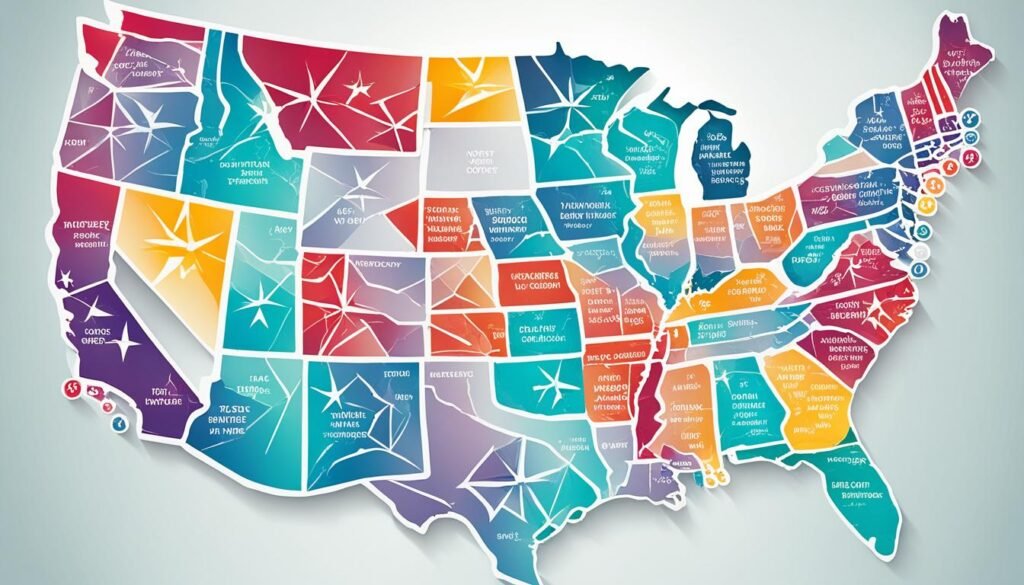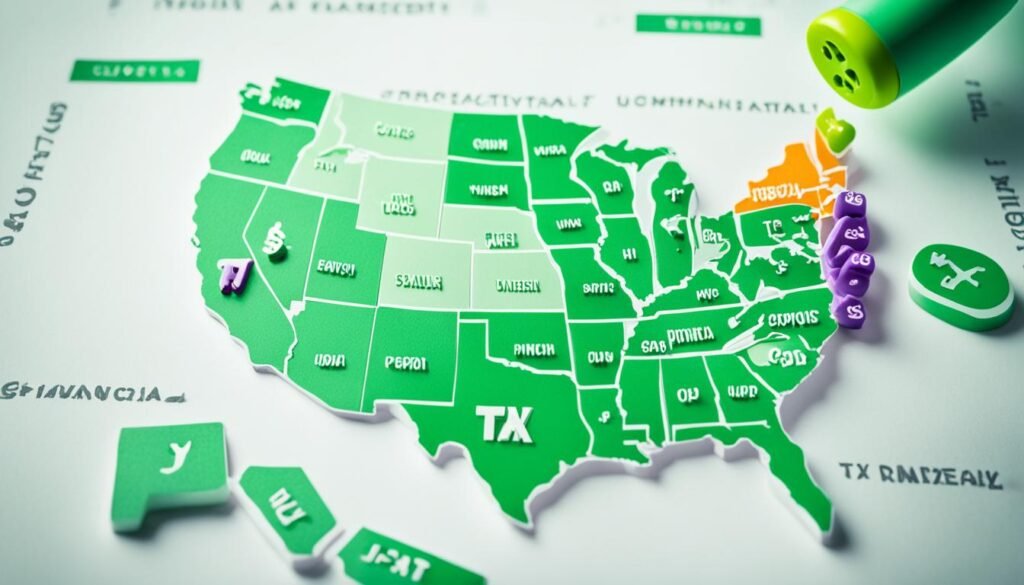
9 States with Zero Income Tax – Know Where to Save
Did you know only nine states in the United States don’t have state income tax? This makes states with zero income tax very appealing. If you’re looking to keep more of what you earn, living in income tax free states can change your money situation. Earn and save more without the state taking part of your income.
People in tax free states enjoy benefits from Alaska’s wilds to Florida’s sunny beaches. Businesses in zero income tax states can put more money into growth and taking care of their workers. See the list of states with no income tax to see how moving could help your finances grow.
Starting a Business or Retiring
Thinking about starting a business or retiring? Knowing the difference between states with no state tax and those with certain tax breaks is key. Things like New Hampshire’s tax on investments, or Texas’s business tax, mean knowledge saves money.
Choosing where to live and work can really affect how much money you keep. In states with no income tax, you can forget the stress of submitting more paperwork in April on tax day. Imagine what you could do with less paperwork and more money in your pocket.
Key Takeaways
- Living in states like Florida and Nevada with no state income tax can substantially boost your financial well-being.
- US states with no income tax become valuable territories for both individuals and businesses seeking economic advantage.
- States with no state tax offer diverse landscapes and opportunities, making them attractive for various lifestyle choices.
- It’s crucial to consider other taxes such as sales, property, and estate taxes when assessing the financial benefits of residency in these tax-free jurisdictions.
- New Hampshire and Texas provide a glimpse into the complexity of state tax systems, with specific types of income and corporate activities still being taxed.
- By becoming well-versed in the tax policies of states with no income tax, you can make informed choices that align with your financial goals.
What are the 9 States with Zero Income Tax?
Dreaming about your retirement? The idea of living in a state with no income tax might seem appealing. It offers big retirement benefits and tax advantages. The U.S. has several places where your income is safe from state taxes. These are Alaska, Florida, Nevada, New Hampshire (until 2027 for dividends and interest income), South Dakota, Tennessee, Texas, Washington, and Wyoming. Each place has its own benefits for residents, making your retirement years even better.
Choosing to live in such states could seem great because of the tax advantages. But, think about the bigger picture, like higher living costs and other taxes. We’ll help you look at the good and the bad. This way, you can understand the total tax load and how affordable it truly is to move there.

Should you Consider Retiring in a “No Income Tax” State? Pros and Cons
The promise of retirement perks might make you think about moving to a tax-free state. It’s important to see both the good and the bad. Not paying state income tax could lower your total taxes. But, extra costs from sales taxes, property taxes, or fees can balance that out. These states need to make up for the money they’re not getting from income taxes.
Examples of How States Offset Income Tax
In Texas, for example, you won’t pay state income tax. But, the property tax there is really high, one of the highest in the country. In places like Tennessee and Nevada, the sales tax is really high too. This can mean a higher cost of living. You need to think about this balance of tax savings and costs in different areas when deciding if it’s worth it to move.
Every state’s tax setup is different, with various deadlines, deductions, and credits. Like in Wyoming, where sales and property tax are lower than most, other costs can still affect how affordable it is. Think about these differences when looking at the overall cost of living and how it fits with your retirement plans.
Consider how states use their budgets, especially for important things like healthcare and education. In South Dakota and Wyoming, for example, they spend less on education. This might not directly affect retirees, but it shows what a state focuses on financially. This could indirectly influence the community services you might need.
| State | Major Revenue Sources | Considerations for Retirees |
|---|---|---|
| Alaska | Property Taxes (~50%) | High property tax but no income tax |
| Florida | Property Taxes, State Taxes | Moderate tax rate overall |
| Nevada | Sales Tax (8.23%) | High sales tax rate |
| New Hampshire | Property Taxes (64%) | High property tax rates, high education costs |
| South Dakota | Property Taxes, Sales Tax | Heavily reliant on property and sales tax |
| Tennessee | Sales Tax (9.55%) | Very high sales tax rate |
| Texas | Property Taxes | High property taxes to offset lack of income tax |
| Washington | Sales Tax, Housing Costs | High sales tax and housing costs |
| Wyoming | Sales and Property Tax Rates | Lower than average rates; reliance on these taxes for revenue |
Everyone’s situation is different, so the idea of retiring in a no income tax state sounds good, but think it through. The higher sales and property taxes might not make it worth it when you see the big picture. Be sure to do a full financial review. This way, your retirement savings will stay solid.
What are the State Tax Policies of these 9 States? Estate Tax, Property Tax, Sales Tax
Residents of Alaska, Florida, Nevada, New Hampshire, South Dakota, Tennessee, Texas, Washington State, and Wyoming face different taxes. These include estate tax, property tax, and sales tax. Remember these policies if you plan to move or retire to one of these no-income-tax states.
Alaska
Alaska has no state income or estate tax. But, local areas can set their own property taxes, so rates vary. There’s no state sales tax, but some places have their own.
Florida
In Florida, there’s no state income tax, but there is a moderate property tax. The state doesn’t have an estate tax. However, a 6% state sales tax exists, with additional local taxes.
Nevada
Nevadans don’t pay state income or estate taxes. Their property taxes are very low, and they have a sales tax. This tax is made up of state and county taxes. The cost of living in Nevada is higher than the national average however, it’s a big winner in the tax department.
New Hampshire
New Hampshire taxes dividends and interest but not earned income. There’s no estate tax. Property taxes are local, and there’s no sales tax, making it attractive.
South Dakota
South Dakota has no income or estate taxes. Property taxes are steady, and there’s a state sales tax. This tax helps fund city services.
Tennessee
Tennessee got rid of income tax and doesn’t have an estate tax. Property taxes depend on the county. The state sales tax is high.
Texas
Texas has no income or estate taxes. Yet, property taxes are higher here than in some states. There’s also a notable sales tax.
Washington State
Washington State has no income tax but does have an estate tax. This tax varies with the estate’s value. Property taxes are average, and the state relies on a higher sales tax.
Wyoming
Wyoming ends our list with no income or estate taxes, and friendly property tax rates. Its sales tax is moderate, offering some breaks like grocery exemptions.

| State | Estate Tax | Property Tax (Median Rate) | Sales Tax |
|---|---|---|---|
| Alaska | None | Varies by locality | None (localities may vary) |
| Florida | None | 0.98% | 6% (plus local) |
| Nevada | None | 0.69% | 6.85% (plus county) |
| New Hampshire | None | 2.05% | None |
| South Dakota | None | 1.31% | 4.5% |
| Tennessee | None | 0.68% | 7% (plus local) |
| Texas | None | 1.83% | 6.25% (plus local) |
| Washington State | Varies by value of estate | 0.93% | 6.5% (plus local) |
| Wyoming | None | 0.61% | 4% (plus local) |
Understanding State Income Tax and Your Retirement Finances
When you plan for retirement, it’s crucial to think about state income tax. This tax plays a big role in your financial future. There are many things that affect your retirement savings, like tax rates and how they apply to your pension. Knowing about tax planning can help ensure you have enough money in your later years. If you’re thinking of moving to a state with no income tax for retirement, it’s important to understand how taxes can impact you.
Why Income Tax Matters to Your Retirement Savings
State income tax can really affect your retirement savings. Taxes reduce the amount of money you have for everyday needs. Living in a state with low or no income tax can help save more of your money. This can lead to a better lifestyle in retirement.
The Link Between State Tax Policies and Your Retirement Income
States have different personal income tax rates and rules. This can greatly affect your retirement income because of state tax policies. Taxes on pension and IRA distributions vary by state. You could get more from your retirement income in states with better tax rules on these distributions. It’s smart to look closely at the tax rules of each state, especially concerning Social Security benefits and pensions.

Should I be Concerned about Tax on my Pension and IRA Distributions?
Yes, you should worry about tax on pension and IRA distributions. These are important parts of most retirement plans. Some states do not tax these incomes, which can leave you with more money to spend. Knowing the tax laws on pensions and IRAs in each state is key for planning your retirement.
Are there other State Taxes that will Affect my Retirement Income?
Even if a state does not tax retirement income, other state taxes may still affect you. Taxes like estate, inheritance, property, and sales taxes can take away some benefits of an income-tax-free state. So, it’s important to look at all state taxes when planning for retirement. This helps you see the full picture of retirement costs.
Now, let’s look at some real numbers:
| Benefit Type | Taxed States | Non-Taxed States |
|---|---|---|
| Social Security Benefits | Colorado, Connecticut, Kansas, et al. (13 total) | Remaining 37 states |
| Pension Income | Varies by state (with exclusions) | Alaska, Florida, Nevada, et al. (14 total) |
| IRA Distributions | Varies by state (with thresholds) | Alaska, Florida, Nevada, et al. (12 total) |
In summary, knowing how state income tax affects your retirement savings is smart. Planning for taxes early helps you make the most of your retirement money. It’s also wise to understand both income tax rates and other state taxes. This knowledge will help you choose the best place to enjoy your retirement.
Analyzing the True Cost of Living in Tax-Free States
Thinking about moving to a state without income tax? It’s important to look closely at the cost of living . Many are drawn to states without income tax. But it’s key to consider housing expenses and affordability concerns.
Housing Expenses and Affordability Concerns
In no-income-tax states, housing expenses are often high. For example, Texas uses higher property taxes to fund services. In fact, 63.8 percent of its revenue is from property taxes, making it highly reliant on them. This can make living costs rise, affecting dreams of owning a home.
The effect of Estate Tax, Property Tax, and Sales Tax
Just because a state has no income tax, doesn’t mean it’s completely tax-free. Consider how estate tax, property tax, and sales tax can impact expenses. Places like Washington and New Hampshire show how high living expenses may outweigh tax benefits. They shape the standard of living.

Additional Living Costs: Healthcare, Utilities, and Grocery
Taxes aside, costs in healthcare, utilities, and grocery bills also shape quality of living. States like South Dakota and Wyoming invest less in services like education. This can affect healthcare and utility costs. It’s about seeing the full picture.
Is it Cheaper to Live in a State without Income Tax?
Does living in a state without income tax save money? At first glance, yes, but dig deeper. The real question is how it matches up against additional living costs. Interesting fact: a Tax Foundation study shows these states grow faster economically. Yet, there’s a 41 percent discrepancy in job and population growth.
Considering Florida, Nevada, or others? Look at all sides of affordability concerns. Use good data and analysis. This helps in making a choice that really improves your life standard and quality of living.
Conclusion
Moving to a state with no income tax can seem tempting. Many see it as a way to save money, especially when retiring. But it’s vital to look closely at state tax policies and living costs, not just the tax savings. For retirees, planning ahead for taxes is crucial to protect income and ensure a smooth start to this new life stage.
The real cost of retirement should include state tax policies which may offset the lack of income tax. Higher property or sales taxes can be a trade-off. True financial freedom means looking beyond just income tax rates. It involves assessing how taxes affect housing, healthcare, and daily living costs. Making a balanced retirement plan means considering these alongside the benefits of tax planning.
When making this big financial move, think about the long-term, not just the short-term tax perks. A complete budget strategy is crucial. It should take into account your future financial well-being. Since each state has its unique tax rules, understanding these differences is key to your financial and living comfort. Advice from financial experts or tax professionals is valuable. They can offer insights tailored to you, helping navigate through tax laws and financial planning. With the right knowledge and advice, you’re ready to make informed decisions for a secure and enjoyable retirement.







